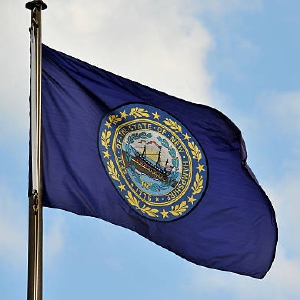Opinion: Time to close the greyhound gambling loophole

Pixabay Pixabay
| Published: 03-18-2024 2:55 PM |
Carey Theil is the executive director of GREY2K USA.
In the coming weeks, the New Hampshire House will vote on a bill to phase out remote betting on greyhound races. SB 363, which has already been unanimously approved by the State senate, deserves a ‘yes’ vote.
Fourteen years ago, lawmakers outlawed greyhound racing in New Hampshire. However, they left in place a loophole that allows remote gambling on dog races happening elsewhere. It’s time to close that loophole, and end the state’s involvement in an activity that is cruel and inhumane.
Being kind to animals is a core value of our society. Dogs are members of our family and deserve to be protected from industries and individuals that would do them harm. That’s why a bipartisan coalition of state lawmakers initially fought for a ban on greyhound racing.
When the greyhound bill was first introduced, gentle dogs were routinely suffering catastrophic injuries at Granite State racetracks. For example, nearly 1,200 greyhound injuries were reported by the New Hampshire Pari-Mutuel Commission between 2005 and 2008, including dogs that suffered broken legs, paralysis, and death from cardiac arrest. Thousands of greyhounds were also enduring lives of confinement at local tracks, kept in warehouse-style kennels in cages barely large enough for them to stand up or turn around.
Of course, the legislative process is designed to foster compromise. So at the same time that lawmakers ended live racing, they allowed remote gambling on dog races taking place elsewhere to continue. This was a way to protect the economic interests of Seabrook Greyhound Park and create an opportunity for it to transform itself. That policy worked, and a struggling dog track has since blossomed into The Brook, a prospering casino that takes more than $500 million annually on sports betting, historic horse racing machines, charity gambling, and simulcasting.
Gambling on greyhound racing is no longer an important part of The Brook’s business model. In 2013 greyhound simulcasting accounted for 43% of all gambling there. Today, that has fallen to roughly 1%. This decline is partly because greyhound racing is ending around the country. It is now illegal in 42 states, and there are only two operational dog tracks left, both in West Virginia. This final remnant of greyhound racing is heavily subsidized, and the company that owns the tracks, Delaware North, has stated it wants racing to end.
The movement to help greyhounds has been remarkably bipartisan, bringing together voices that agree on nothing else. In 2018 Florida voted to outlaw greyhound racing and shutter a dozen dog tracks. This was accomplished via a constitutional amendment that passed by a margin of 69% to 31%, and with the support of Lara Trump, Mike Huckabee, Governor Rick Scott, Attorney General Pam Bondi, Matt Gaetz, the League of Women Voters, Democratic gubernatorial candidate Andrew Gillum and Democratic Attorney General candidate Sean Shaw.
Article continues after...
Yesterday's Most Read Articles
 With Concord down to one movie theater, is there a future to cinema-going?
With Concord down to one movie theater, is there a future to cinema-going?
 “It’s beautiful” – Eight people experiencing homelessness to move into Pleasant Street apartments
“It’s beautiful” – Eight people experiencing homelessness to move into Pleasant Street apartments
 No deal. Laconia buyer misses deadline, state is out $21.5 million.
No deal. Laconia buyer misses deadline, state is out $21.5 million.
 Quickly extinguished fire leaves Concord man in critical condition
Quickly extinguished fire leaves Concord man in critical condition
 Concord police ask for help in identifying person of interest in incidents of cars being keyed during Republican Party event
Concord police ask for help in identifying person of interest in incidents of cars being keyed during Republican Party event
 Update: Victim identified in Lantern Lane fire in Concord
Update: Victim identified in Lantern Lane fire in Concord
Thanks to these champions, fewer greyhounds suffer today than in the past. Yet the problem is not solved. In just the last two years, 1,293 greyhound injuries have been reported at Mardi Gras and Wheeling dog tracks in West Virginia. During the same time period, 407 dogs suffered broken bones and 17 dogs died. Our nonprofit organization also recently documented unconscionable “live lure” training operations in four states, in which greyhounds are given small animals to tear apart.
Just as disturbing is the fact that foreign dog tracks have begun to infiltrate the U.S. market in an effort to extract hard-earned American dollars and siphon them off to offshore gambling operators. The most egregious example is Agua Caliente, a Mexican dog track with suspected links with organized crime. As recently as December, The Brook was offering races from Caliente, which is owned by an alleged cartel associate named Jorge Hank Rhon. It should concern every citizen that New Hampshire dollars have been leaving the state and used to line the pockets of this underworld operation.
Gambling on greyhound racing provides the state with very little tax revenue and does not contribute a single cent to local charities. It is a cruel, depression-era relic that should be put in the history books for good. New Hampshire has a proud tradition of leading on animal welfare issues. Lawmakers should cast a vote for the dogs, and close the greyhound gambling loophole.


 Opinion: The truth of it
Opinion: The truth of it Opinion: Public school standards overhaul will impact every facet of public education in NH
Opinion: Public school standards overhaul will impact every facet of public education in NH Opinion: A bad idea for New Hampshire
Opinion: A bad idea for New Hampshire Opinion: Medical Aid in Dying would have spared my father’s suffering
Opinion: Medical Aid in Dying would have spared my father’s suffering
